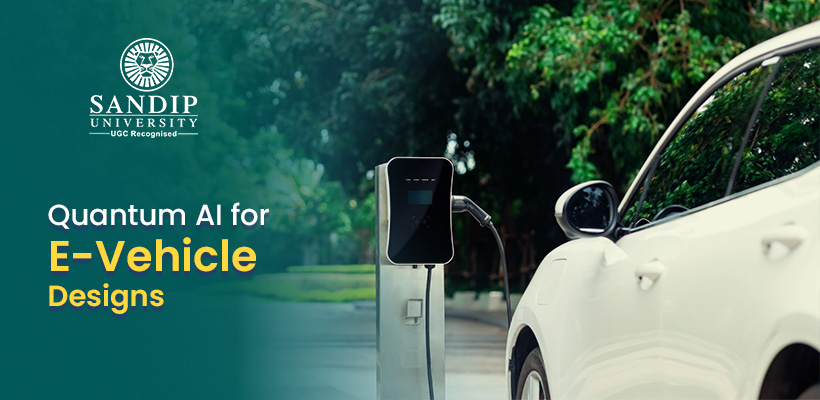Quantum AI has the potential to significantly impact the design and optimisation of electric vehicles (EVs) in various aspects, ranging from battery technology to vehicle control systems. Leading engineering colleges in India offer M.Tech in Electrical Vehicles program to train the next generation of engineers in this field.
Below are some potential applications of quantum AI in the design of e-vehicles:
1. Battery Design and Optimisation
- Quantum AI algorithms can accelerate the discovery and design of new battery materials with improved energy density, longevity, and charging efficiency.
- Quantum simulations can model complex electrochemical processes at the atomic level, providing insights into battery performance and degradation mechanisms.
- Quantum-inspired optimisation techniques can optimise battery pack design, cell arrangement, and thermal management strategies to enhance overall performance and safety.
- Energy Storage and Management
- Quantum AI can optimise energy storage systems and management algorithms in e-vehicles, maximising energy efficiency and range.
- Quantum-inspired control algorithms can dynamically adjust battery charging and discharging rates, considering factors such as driving conditions, traffic patterns, and user preferences.
- Quantum reinforcement learning techniques can learn optimal energy management policies based on real-time sensor data, driver behaviour, and environmental factors.
- Vehicle Control and Autonomy
- Quantum AI algorithms can improve vehicle control systems and autonomous driving capabilities in e-vehicles, enhancing safety and efficiency on the road.
- Quantum-inspired decision-making algorithms can optimise trajectory planning, lane keeping, and collision avoidance manoeuvres, considering uncertain and dynamic environments.
- Quantum reinforcement learning approaches can train autonomous driving agents to adapt to diverse driving scenarios and learn from experience to improve performance over time.
- Charging Infrastructure Optimisation
- Quantum AI can optimise the design and deployment of charging infrastructure for e-vehicles, considering factors such as location, capacity, and grid integration.
- Quantum-inspired optimisation techniques can identify optimal locations for charging stations, predict demand patterns, and optimise charging schedules to minimise waiting times and grid congestion.
- Quantum reinforcement learning algorithms can optimise charging station operations and pricing strategies to incentivise efficient use of charging infrastructure and encourage adoption of e-vehicles.
- Supply Chain Management
- Quantum AI can optimise supply chain management and logistics for e-vehicle components, including batteries, motors, and electronic components.
- Quantum-inspired algorithms can optimise inventory management, procurement decisions, and transportation routes to reduce costs and lead times for e-vehicle production.
- Quantum reinforcement learning approaches can optimise production scheduling and assembly processes to improve manufacturing efficiency and meet demand fluctuations.
- Life Cycle Assessment and Sustainability
- Quantum AI can facilitate life cycle assessment and sustainability analysis of e-vehicles, considering environmental impacts, energy consumption, and resource utilisation throughout the vehicle life cycle.
- Quantum-inspired models can quantify the environmental benefits of e-vehicles compared to internal combustion engine vehicles, taking into account factors such as manufacturing emissions, vehicle operation, and end-of-life disposal.
- Quantum reinforcement learning techniques can optimise vehicle design and production processes to minimise environmental footprint and maximise sustainability.
Conclusion
Overall, Quantum AI holds great promise for optimising the design, operation, and adoption of e-vehicles, contributing to a cleaner, more sustainable transportation ecosystem. However, realising these benefits will require further research, collaboration, and investment to overcome technical challenges and scale Quantum AI solutions for real-world applications in the automotive industry.

